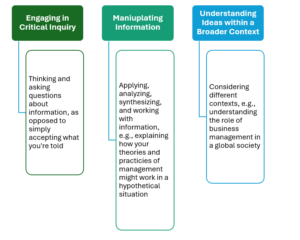What Makes Learning College-Level?
Key Takeaway
All learning is based on experience, but not all experience results in college-level learning.
In order to receive college credit for your experiential learning, that learning needs to be college-level. College level means that you should be able to generalize concepts from the knowledge you gained, apply those concepts to other situations, analyze various solutions to a challenge, and more.
College-level knowledge means
College-level knowledge is not just the ability to recall information or do something in one way; instead, it’s the ability to use, apply, and generalize from the information gained.
Experiential Learning also requires thinking and action
David Kolb, in his research on experiential learning, describes that learning happens in four stages:[1]
- Experience
- Observation and Reflection
- Thinking – creating generalizations and abstract concepts based on your observations and reflections
- Applying the concepts, analyzing the outcomes, and applying your new knowledge to new experiences
Relationship of College-Level Knowledge and Experiential Learning
College-level knowledge incorporates all four stages of experiential learning, not just the first stage. You cannot get credit simply for the fact that you ran your own business, directed a play, resolved labor disputes, or spoke in public. However, you can get credit for the knowledge you use to run your business, to direct that play, to understand what precisely you are doing as you negotiate with management, and to understand what makes your speeches effective.
The following video offers additional ways of explaining learning and college-level learning.
Here’s a simple breakdown of the difference between experience and college-level experiential learning that colleges consider when awarding credit.
The Basic Rule for getting Credit for Experiential Learning
Colleges recommend credit for what you’ve learned from your experience, not just the experience itself.
Experience = Doing Things
Experience consists of the actual tasks and activities you’ve performed. For example:
- Writing emails at work
- Managing employees
- Making sales calls
- Running meetings
Learning = Understanding Why and How
Learning means you understand the deeper principles behind what you do. You can explain why certain approaches work better than others and apply that knowledge to new situations. For example:
- Understanding how to communicate differently with different types of customers
- Knowing which management techniques work best in different situations
- Being able to adapt your skills to new companies or roles
Why This Matters for College Credit
Just because you’ve done something for years doesn’t automatically mean you should get college credit. The key question is: Do you understand the principles behind what you do well enough to apply them in different situations?
How to Think About Your Own Experience
- Start by listing what you’ve actually done (your experience)
- Then ask yourself what you learned from doing those things
- Can you explain why certain approaches work better than others?
- Could you teach someone else or adapt your knowledge to a completely different situation?
If you can demonstrate real learning and understanding from your experience, that’s when colleges will consider giving you credit for it.
Follow the link below for an interactive review of college-level learning hosted by Claude AI:
https://claude.ai/public/artifacts/0a65f5ac-5feb-4cbe-9d85-352a33c87dcb
Key Takeaway
College-level knowledge is not just the ability to recall information or do something in one way; instead, it’s the ability to consider, generalize from, and apply the information gained.
- https://experientiallearninginstitute.org/what-is-experiential-learning/ ↵

